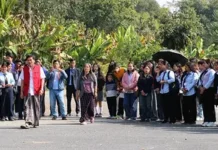[KJM Varma]
BEIJING, 16 Sep: China’s top security official visited Tibet last week and instructed the local authorities to step up a crackdown against separatists against the backdrop of the US stepping up its support for the region by passing a new law pressing Beijing to hold talks with the Dalai Lama.
Chen Wenqing, the head of the Central Political and Legal Affairs Commission – the ruling Communist Party’s top security body – visited the Tibet Autonomous Region (TAR) and some of the 10 Tibetan autonomous prefectures across Yunnan, Sichuan, Gansu and Qinghai last week and reviewed security. He called for a resolute crackdown against separatists.
He also asked the local officials to maintain stability and guard against independence activities, the Hong Kong-based South China Morning Postreported on Monday.
His visit took place as China is tightening security in Tibet ahead of the 75th anniversary of the founding of the People’s Republic to be celebrated on 1 October.
China’s top judges and prosecutors have also made their rounds of Tibet.
Supreme People’s Court President Zhang Jun visited Tibetan courts last week and said it was necessary to hand down tough punishment to keep up the pressure on “violent terrorism, ethnic separatism and other serious criminal crimes,” the Post reported.
Supreme People’s Procuratorate Head Ying Yong also inspected public prosecutors’ offices in Tibet earlier this month. He stressed the need for prosecutors to “harshly crack down on all kinds of separatist infiltration, sabotage activities and crimes endangering national security in accordance with the law.”
In July, the US passed the Resolve Tibet Act, which enhances its support for Tibet and promotes dialogue between China and the Dalai Lama towards a peaceful resolution of the dispute over the status and governance of the remote Himalayan region.
Signing the legislation passed by the US senate and the Congress in July, President Joe Biden said it showed the bipartisan commitment in America to advancing the human rights of Tibetans and supporting efforts to preserve their distinct linguistic, cultural, and religious heritage.
He also called on Beijing to resume direct dialogue, without preconditions, with the Dalai Lama, or his representatives, to “seek a settlement that resolves differences and leads to a negotiated agreement on Tibet.”
China opposed the Resolve Tibet Act, terming it a destabilising Act.
The Act enhances US support for Tibet, empowering state department officials to actively and directly counter disinformation about Tibet from the Chinese government.
It also rejects Beijing’s claims that Tibet has been part of China since “ancient times,” pushing for negotiations without preconditions between the Chinese government and the Dalai Lama or his representatives or the democratically elected leaders of the Tibetan community.
Last month, China lodged “serious protest” with the US after a top Biden administration official met the Dalai Lama and reaffirmed Washington’s commitment for advancing the human rights of Tibetans and supporting efforts to preserve their distinct historical, linguistic, cultural, and religious heritage.
Uzra Zeya, the US Undersecretary of State for Civilian Security, Democracy, and Human Rights and Special Coordinator for Tibetan Issues, met the Dalai Lama in New York while he was recuperating after undergoing a successful knee replacement surgery.
Reacting to Zeya’s meeting with the Dalai Lama, Chinese foreign ministry spokesperson Mao Ning last month told a media briefing here that the 14th Dalai Lama is not a purely religious figure, still less a figure promoting “non-violence” and “peace,” but a political exile engaged in anti-China separatist activities under the cloak of religion.
“China firmly opposes any country allowing the Dalai Lama to make visits under any pretext and opposes government officials of any country meeting with the Dalai Lama in any form,” she said.
“We’ve made a serious protest with the US. The appointment of the so-called ‘US Special Coordinator for Tibetan Issues’ onstitutes an interference in China’s internal affairs. China has never recognised it,” Ning said. (PTI)


